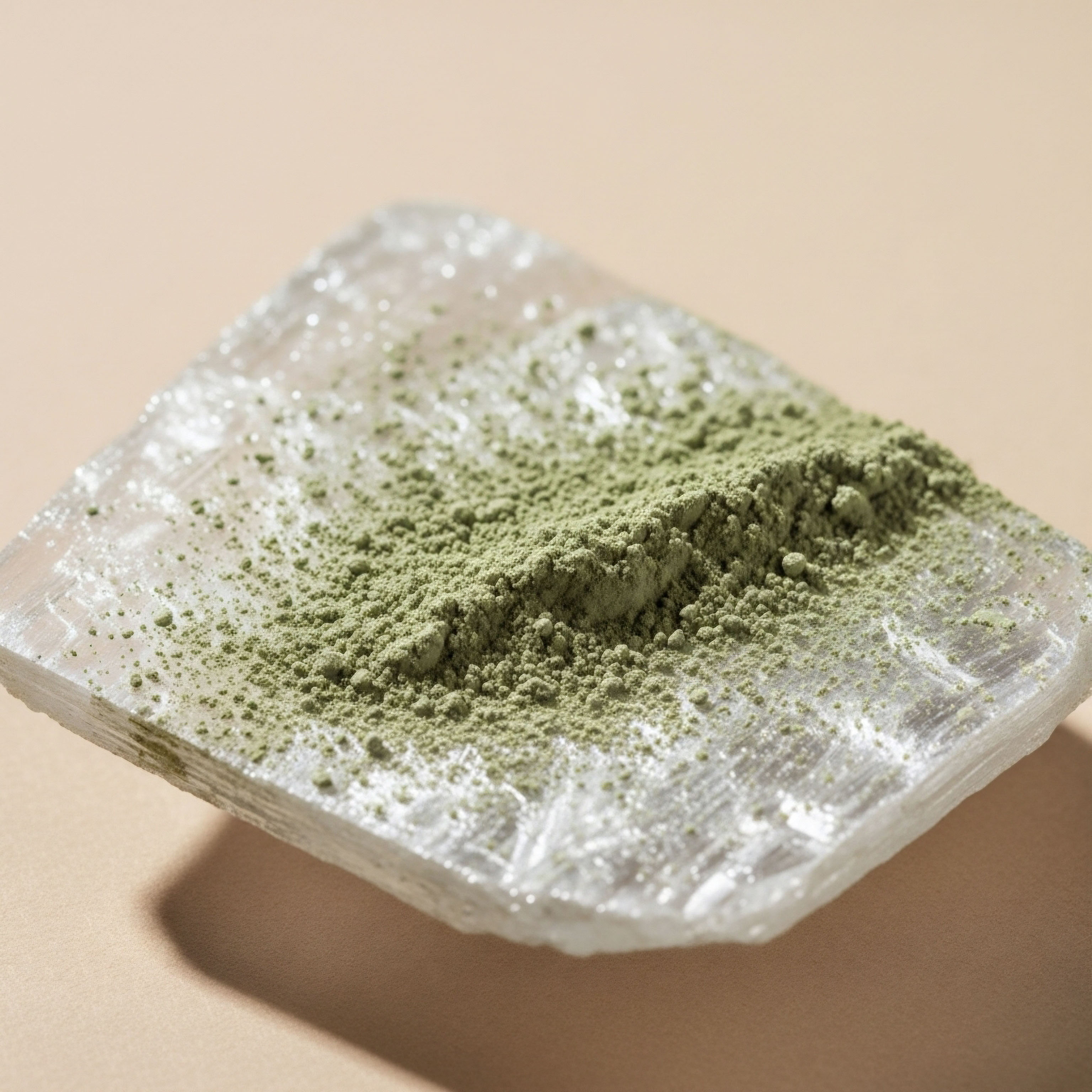

Fundamentals
Many individuals experience moments when mental clarity seems to slip away, when the sharpness of thought or the ease of recall feels diminished. Perhaps you have noticed a subtle fogginess, a reduced capacity for focus, or a general sense that your cognitive processing is not as fluid as it once was.
These shifts can be unsettling, prompting questions about what might be occurring within your biological systems. Such experiences are not merely isolated incidents; they often signal deeper conversations happening within your body’s intricate internal communication networks, particularly those involving hormones. Understanding these signals marks the initial step toward reclaiming your vitality and mental acuity.
Our biological systems operate through a complex interplay of chemical messengers, with hormones serving as vital signals that orchestrate countless bodily functions. These include not only reproductive processes and metabolic regulation but also profoundly influence our cognitive landscape.
When these hormonal systems experience shifts, whether due to natural aging, environmental factors, or specific medical interventions, the effects can ripple throughout the entire organism, impacting how we think, feel, and interact with the world. A key area of interest involves the delicate balance of the endocrine system and its influence on brain function, especially when certain hormonal pathways are intentionally modulated.
Hormonal shifts can significantly influence mental clarity and cognitive function, reflecting the body’s interconnected biological systems.
The human body possesses several crucial neuroendocrine axes, which function like sophisticated regulatory circuits. Two prominent examples include the Hypothalamic-Pituitary-Gonadal (HPG) axis and the Growth Hormone (GH) axis. The HPG axis governs the production of sex hormones such as testosterone, estrogen, and progesterone, which are known to influence brain structure and function, including areas responsible for memory and learning.
The GH axis, conversely, controls the release of growth hormone and its downstream mediator, Insulin-like Growth Factor-1 (IGF-1), both of which play roles in cellular repair, metabolism, and neuronal health. These axes do not operate in isolation; they communicate constantly, influencing each other’s activity and, by extension, your overall physiological and cognitive state.
When we discuss “hormonal suppression,” we refer to a deliberate reduction in the activity of certain hormonal pathways. This often occurs in clinical settings, such as during testosterone replacement therapy (TRT) for men or specific hormonal interventions for women.
For instance, exogenous testosterone administration in men can lead to a downregulation of the HPG axis, causing the body’s natural testosterone production to diminish. Similarly, certain treatments in women might temporarily reduce ovarian hormone output. While these interventions serve important therapeutic purposes, they can introduce a new set of considerations regarding their broader systemic effects, particularly on cognitive function.

What Is the Role of Growth Hormone in Brain Health?
Growth hormone, often associated with physical growth and development, holds a significant, yet often overlooked, role in maintaining adult brain health. This peptide hormone, secreted by the pituitary gland, influences various aspects of neuronal function and integrity.
It contributes to processes such as neurogenesis, the formation of new neurons, and synaptic plasticity, the ability of brain connections to strengthen or weaken over time. These processes are fundamental to learning, memory, and overall cognitive adaptability. When growth hormone levels decline, which naturally occurs with aging, individuals may experience changes in energy levels, body composition, and mental acuity.
The actions of growth hormone are often mediated by IGF-1, a powerful anabolic hormone produced primarily in the liver in response to GH stimulation. IGF-1 can cross the blood-brain barrier and exert direct effects on brain cells, promoting neuronal survival and supporting the health of brain vasculature.
This dual action of GH and IGF-1 underscores their importance in preserving cognitive vitality. A decline in either of these vital compounds can contribute to a feeling of mental sluggishness or a reduced capacity for complex thought.

How Do Hormonal Shifts Affect Mental Acuity?
The connection between hormonal status and cognitive performance is a dynamic area of study. In men, reduced testosterone levels, a condition known as hypogonadism, have been associated with various cognitive changes. Individuals with lower testosterone may report difficulties with memory tasks, working memory, and attention.
This is because testosterone and its metabolites, including estradiol, act on receptors in key brain regions involved in cognitive processes, such as the hippocampus and amygdala. When these hormonal signals are less robust, the efficiency of neural communication can be compromised, leading to noticeable alterations in mental function.
For women, the hormonal transitions of perimenopause and postmenopause, characterized by fluctuating and eventually declining estrogen and progesterone levels, can similarly influence cognitive experiences. Many women report “brain fog,” memory lapses, and changes in processing speed during these periods.
Estrogen, in particular, plays a role in regulating synaptic plasticity and neurogenesis, and its reduction can impact cholinergic system functioning, which is crucial for memory. Progesterone also influences brain chemistry, affecting neurotransmitters and potentially impacting verbal working memory. These lived experiences of cognitive change are not simply anecdotal; they reflect measurable biological shifts within the brain’s delicate hormonal environment.
The intricate balance of these hormonal systems means that when one axis is suppressed, it can have cascading effects. For instance, while testosterone replacement therapy aims to restore optimal androgen levels, the suppression of endogenous testosterone production can also influence the broader neuroendocrine milieu.
This raises a pertinent question ∞ can interventions targeting the growth hormone axis, such as the use of specific peptides, offer a supportive role in maintaining or enhancing cognitive function when other hormonal systems are intentionally modulated or naturally declining? This inquiry moves beyond a simplistic view of individual hormones, instead considering the body as an interconnected system where balance is paramount for optimal well-being.


Intermediate
Understanding the foundational role of hormones in cognitive function sets the stage for exploring how specific clinical protocols aim to recalibrate these systems. When addressing concerns related to hormonal balance and mental acuity, especially in contexts of hormonal suppression, practitioners often consider targeted interventions. Growth hormone peptide therapy represents one such avenue, designed to stimulate the body’s natural production of growth hormone, thereby influencing a cascade of physiological processes, including those pertinent to brain health.

How Do Growth Hormone Peptides Operate?
Growth hormone peptides are synthetic compounds that mimic the actions of naturally occurring hormones or factors within the body, primarily aiming to stimulate the pituitary gland to release more endogenous growth hormone. This approach differs from direct human growth hormone (HGH) administration, as it encourages the body’s own regulatory mechanisms to produce GH in a more physiological, pulsatile manner. This pulsatile release is considered important for avoiding certain off-target effects and maintaining the body’s natural rhythm of hormone secretion.
Several key peptides are utilized in this therapeutic category, each with distinct mechanisms and clinical applications ∞
- Sermorelin ∞ This peptide is a synthetic analog of Growth Hormone-Releasing Hormone (GHRH), a hypothalamic hormone. Sermorelin acts directly on the pituitary gland, binding to GHRH receptors and stimulating the release of growth hormone. It is known for extending growth hormone peaks and increasing trough levels, promoting a more sustained elevation of GH.
- Ipamorelin ∞ As a selective growth hormone secretagogue, Ipamorelin mimics the action of ghrelin, a hormone primarily known for regulating appetite. Ipamorelin binds to the ghrelin/growth hormone secretagogue receptor, directly stimulating GH release from the pituitary gland. It is recognized for causing significant, albeit short-lived, spikes in GH levels without substantially affecting cortisol or prolactin, which can be a concern with some other secretagogues.
- CJC-1295 ∞ This peptide is a modified version of GHRH, similar to Sermorelin, but engineered with a Drug Affinity Complex (DAC) to extend its half-life significantly. This extended half-life means it can stimulate GH production for several days after a single administration, offering a more sustained release profile compared to shorter-acting peptides. It is often combined with Ipamorelin to achieve both sustained and pulsatile GH release.
- Tesamorelin ∞ Another synthetic GHRH analog, Tesamorelin is particularly potent in increasing IGF-1 levels, often by a substantial margin. It is known for its specific effects on reducing visceral adipose fat and improving cognitive function, making it a focus in certain clinical contexts.
- Hexarelin ∞ Similar to Ipamorelin, Hexarelin is a growth hormone secretagogue that stimulates GH release. It is a potent peptide, though it may have a broader impact on other hormones compared to Ipamorelin.
- MK-677 (Ibutamoren) ∞ While not strictly a peptide, MK-677 is an orally active growth hormone secretagogue that mimics ghrelin’s action, leading to sustained increases in GH and IGF-1 levels. Its oral bioavailability makes it a convenient option for some individuals seeking to support GH production.
These peptides work by influencing the body’s natural signaling pathways, essentially sending a clear message to the pituitary gland to enhance its output of growth hormone. This mechanism supports the body’s innate intelligence, rather than overriding it, allowing for a more balanced physiological response. The resulting increase in GH and IGF-1 levels can contribute to improved body composition, enhanced energy, better sleep quality, and, importantly, support for cognitive functions.

Navigating Hormonal Suppression Protocols
Hormonal suppression, particularly of sex hormones, is a common outcome of various therapeutic protocols. For men, Testosterone Replacement Therapy (TRT) often involves the administration of exogenous testosterone, such as weekly intramuscular injections of Testosterone Cypionate.
While highly effective at restoring circulating testosterone levels and alleviating symptoms of low testosterone, this exogenous input signals to the brain that sufficient testosterone is present, leading to a downregulation of the HPG axis. This can result in suppressed natural testosterone production and, in some cases, reduced testicular size and fertility.
To mitigate these effects and maintain the integrity of the HPG axis, comprehensive TRT protocols often include additional medications. Gonadorelin, a synthetic form of GnRH, is frequently administered via subcutaneous injections to stimulate the pituitary’s production of Luteinizing Hormone (LH) and Follicle-Stimulating Hormone (FSH), thereby preserving testicular function and natural testosterone synthesis.
Anastrozole, an aromatase inhibitor, is also commonly used to manage the conversion of exogenous testosterone into estrogen, preventing potential side effects associated with elevated estrogen levels. In some instances, Enclomiphene may be included to specifically support LH and FSH levels, further aiding in the preservation of endogenous production.
For women, hormonal balance protocols vary based on menopausal status and presenting symptoms. Pre-menopausal, peri-menopausal, and post-menopausal women experiencing symptoms like irregular cycles, mood changes, hot flashes, or reduced libido may benefit from targeted hormonal support. This can involve low-dose Testosterone Cypionate via subcutaneous injection, which can enhance libido and overall well-being.
Progesterone is often prescribed, particularly for peri- and post-menopausal women, to support uterine health and address symptoms such as sleep disturbances and mood fluctuations. Long-acting testosterone pellets, sometimes combined with Anastrozole when appropriate, offer a consistent delivery method for sustained hormonal support.
Growth hormone peptides offer a physiological approach to support GH levels, complementing sex hormone optimization protocols.
A distinct protocol is designed for men who have discontinued TRT or are actively pursuing fertility. This Post-TRT or Fertility-Stimulating Protocol aims to reactivate the suppressed HPG axis. It typically includes Gonadorelin to stimulate pituitary function, alongside Tamoxifen and Clomid.
Tamoxifen, a selective estrogen receptor modulator (SERM), can block estrogen’s negative feedback on the hypothalamus and pituitary, encouraging LH and FSH release. Clomid (clomiphene citrate) similarly stimulates gonadotropin release. Anastrozole may be an optional addition to manage estrogen levels during this period of hormonal recalibration.

Synergistic Support for Cognitive Vitality
The question of whether growth hormone peptides can influence cognitive function during hormonal suppression becomes particularly relevant when considering the interconnectedness of these systems. When sex hormone levels are modulated, either therapeutically or naturally, the brain’s environment shifts. Growth hormone and IGF-1 are known neuroprotective agents, supporting neuronal survival, neurogenesis, and synaptic plasticity. Therefore, maintaining optimal levels of these factors, even when sex hormones are suppressed, could offer a supportive mechanism for cognitive resilience.
Consider the scenario of a man undergoing TRT. While his testosterone levels are optimized, his endogenous production is suppressed. This suppression, while beneficial for overall androgen status, might alter the delicate balance of other neuroendocrine signals.
Introducing growth hormone peptides in such a context could provide a compensatory or additive benefit, ensuring that the brain continues to receive ample support for its metabolic and structural integrity. Tesamorelin, for instance, has shown direct benefits on cognitive function and visceral fat reduction, which itself can indirectly support brain health by reducing systemic inflammation.
Similarly, for women navigating perimenopause, where estrogen and progesterone levels fluctuate and decline, the addition of growth hormone peptides could help mitigate some of the cognitive changes experienced. By promoting brain health through increased GH and IGF-1, these peptides might help preserve mental acuity during a period of significant hormonal transition. The goal is to provide comprehensive support, recognizing that the body’s systems are not isolated but rather operate as a unified network.
The table below outlines the primary growth hormone peptides and their key benefits, many of which extend to cognitive support.
| Peptide Name | Mechanism of Action | Key Benefits (Cognitive & General) |
|---|---|---|
| Sermorelin | GHRH analog, stimulates pituitary GH release. | Supports natural GH pulsatility, improved sleep, body composition, cognitive clarity. |
| Ipamorelin | Ghrelin mimetic, selective GH secretagogue. | Significant GH spikes, minimal cortisol/prolactin impact, improved sleep, muscle gain, cognitive support. |
| CJC-1295 | Long-acting GHRH analog (with DAC). | Sustained GH and IGF-1 elevation, enhanced muscle mass, fat loss, mental performance. |
| Tesamorelin | Potent GHRH analog. | Significant IGF-1 increase, visceral fat reduction, improved cognition, reduced inflammation. |
| Hexarelin | GH secretagogue, ghrelin mimetic. | Potent GH release, muscle growth, anti-aging effects, cognitive support. |
| MK-677 (Ibutamoren) | Oral ghrelin receptor agonist. | Sustained GH/IGF-1 increase, bone health, tissue repair, sleep improvement, cognitive support. |
This strategic application of growth hormone peptides alongside sex hormone optimization protocols represents a sophisticated approach to wellness. It acknowledges the intricate feedback loops within the endocrine system and seeks to provide comprehensive support, ensuring that even when one hormonal pathway is intentionally modulated, other vital systems, such as cognitive function, remain robustly supported. The aim is to achieve a state of biochemical recalibration that promotes overall vitality and function without compromise.


Academic
The interplay between hormonal systems and cognitive function represents a frontier in neuroendocrinology, particularly when considering the impact of therapeutic hormonal suppression. A deep understanding of how growth hormone peptides might influence cognitive function during such states requires an exploration of complex biological axes, cellular signaling pathways, and their direct and indirect effects on neural architecture. The brain, a highly metabolically active organ, is exquisitely sensitive to fluctuations in its hormonal milieu, with profound implications for mental processing.

Neuroendocrine Axes and Cognitive Architecture
The central nervous system is not merely a recipient of hormonal signals; it is an active participant in their regulation and a primary target for their actions. The Hypothalamic-Pituitary-Gonadal (HPG) axis and the Growth Hormone (GH) axis are intricately connected, forming a neuroendocrine network that modulates everything from reproductive capacity to metabolic homeostasis and cognitive performance.
The hypothalamus, a key orchestrator, releases Gonadotropin-Releasing Hormone (GnRH) to control the HPG axis and Growth Hormone-Releasing Hormone (GHRH) and somatostatin to regulate the GH axis. These releasing hormones act on the pituitary gland, which then secretes gonadotropins (LH, FSH) and growth hormone, respectively.
Sex hormones, including testosterone, estradiol, and progesterone, exert their influence on cognitive function through various mechanisms. Receptors for these steroids are widely distributed throughout the brain, particularly in regions critical for memory and learning, such as the hippocampus, prefrontal cortex, and amygdala.
For instance, estradiol can regulate synaptic plasticity, adult neurogenesis, and cerebral blood flow, all of which are fundamental to cognitive health. Testosterone similarly impacts visuospatial abilities and memory, potentially through its direct action or conversion to estradiol. Progesterone also influences neuronal activity, affecting neurotransmitter systems like GABA and acetylcholine, and has been linked to verbal working memory.
When hormonal suppression occurs, such as during androgen deprivation therapy for prostate cancer or GnRH agonist treatment for endometriosis, the reduction in circulating sex steroids can lead to observable cognitive changes, often described as “brain fog” or deficits in specific cognitive domains like verbal memory and attention. This highlights the neuroprotective and neuromodulatory roles of endogenous sex hormones. The challenge then becomes how to support cognitive resilience when these crucial hormonal signals are intentionally diminished.

Can Growth Hormone Peptides Influence Cognitive Function during Hormonal Suppression?
The hypothesis that growth hormone peptides can influence cognitive function during hormonal suppression stems from the established neurotrophic and neuroprotective properties of the GH-IGF-1 axis. Growth hormone and IGF-1 are known to promote neuronal survival, enhance neurogenesis, and support synaptic function. They influence brain metabolism, reduce inflammation, and can even protect against excitotoxicity, a process of neuronal damage caused by overstimulation.
In states of sex hormone suppression, the brain’s metabolic and structural integrity may be challenged. For example, reduced testosterone in men undergoing TRT, despite exogenous replacement, can lead to a state where the brain’s natural hormonal environment is altered. While TRT aims to restore systemic testosterone, the suppression of endogenous production means the intricate, pulsatile release patterns and local brain synthesis of sex steroids might be affected. This is where growth hormone peptides could offer a compensatory or synergistic benefit.
Studies indicate that systemic administration of GH or GH-releasing peptides like GHRP-6 can significantly increase IGF-1 mRNA levels in critical brain regions such as the hypothalamus, cerebellum, and hippocampus. This local increase in IGF-1, a potent neurotrophic factor, can activate intracellular signaling pathways associated with anti-apoptotic actions and cell survival.
For instance, GHRP-6 has demonstrated neuroprotective effects against glutamate excitotoxicity in hypothalamic neurons, independent of IGF-1 induction, by blocking caspase-independent cell death pathways. This suggests a direct neuroprotective role for growth hormone secretagogues at the cellular level within the brain.
Growth hormone peptides may offer neuroprotective support during sex hormone suppression by enhancing brain IGF-1 and activating cell survival pathways.
Tesamorelin, a GHRH analog, has shown particular promise in clinical trials. Beyond its well-documented effects on reducing visceral fat, Tesamorelin has been associated with improvements in cognitive function. This could be attributed to its robust ability to increase IGF-1 levels, which in turn supports neuroplasticity and brain vascular health. The reduction in systemic inflammation, often associated with excess visceral fat, also indirectly benefits cognitive function, as chronic inflammation is a known contributor to cognitive decline.
The table below provides a deeper look into the neurobiological mechanisms influenced by growth hormone and its peptides.
| Mechanism | Description | Relevance to Cognition |
|---|---|---|
| Neurogenesis | Formation of new neurons, particularly in the hippocampus. | Essential for learning, memory consolidation, and cognitive flexibility. |
| Synaptic Plasticity | Ability of synapses to strengthen or weaken over time. | Underpins learning, memory formation, and adaptive brain function. |
| Neuroprotection | Protection of neurons from damage and apoptosis. | Preserves neuronal populations, preventing cognitive decline. |
| Cerebrovascular Health | Support for blood vessel integrity and function in the brain. | Ensures adequate oxygen and nutrient supply, vital for cognitive performance. |
| Inflammation Modulation | Reduction of neuroinflammation. | Chronic inflammation negatively impacts neuronal function and contributes to cognitive impairment. |
| Neurotransmitter Balance | Influence on various neurotransmitter systems. | Affects mood, attention, motivation, and overall cognitive processing. |
The evidence suggests that growth hormone peptides, by augmenting the GH-IGF-1 axis, can provide a layer of neurobiological support that may counteract some of the cognitive challenges associated with hormonal suppression. This is not a direct replacement for sex hormone function but rather a complementary strategy that supports the brain’s overall resilience and metabolic health.
The precise mechanisms involve complex intracellular signaling cascades, including the activation of anti-apoptotic proteins like Bcl-2 and interference with pro-apoptotic pathways. This multi-modal influence on brain physiology positions growth hormone peptides as a compelling consideration in personalized wellness protocols, particularly for individuals navigating periods of intentional hormonal modulation.

Clinical Implications and Future Directions
The clinical implications of integrating growth hormone peptides into protocols involving hormonal suppression are significant. For men on TRT, where endogenous testosterone production is downregulated, the addition of peptides like Sermorelin or CJC-1295/Ipamorelin could help maintain optimal IGF-1 levels, potentially mitigating any subtle cognitive shifts related to the altered neuroendocrine environment. This comprehensive approach ensures that while sex hormone levels are optimized, the brain’s intrinsic support systems are also robustly maintained.
Similarly, for women undergoing hormonal balancing protocols, especially those experiencing perimenopausal cognitive changes, growth hormone peptides could offer a supportive intervention. While estrogen and progesterone therapies address specific symptoms, the neuroprotective benefits of GH and IGF-1 could provide an additional layer of cognitive resilience, helping to preserve memory and mental clarity during a period of significant physiological transition. The aim is to create a more stable and supportive internal environment for optimal brain function.
Despite promising preclinical and anecdotal evidence, larger, long-term randomized controlled trials are still needed to fully elucidate the specific cognitive benefits of growth hormone peptides in the context of various hormonal suppression protocols. Such studies would ideally employ comprehensive neuropsychological assessments and neuroimaging techniques to precisely quantify cognitive changes and identify underlying neural mechanisms. This rigorous scientific inquiry will refine our understanding and optimize clinical application.
The focus remains on a personalized approach, where individual biological systems are carefully assessed, and protocols are tailored to support overall well-being. The integration of growth hormone peptides into existing hormonal optimization strategies represents a sophisticated step toward addressing the complex interplay between endocrine health and cognitive vitality, offering a path to reclaim mental sharpness and functional capacity.

What Are the Long-Term Cognitive Outcomes of Growth Hormone Peptide Therapy?
The long-term cognitive outcomes associated with growth hormone peptide therapy, particularly when used alongside hormonal suppression, represent a crucial area of ongoing investigation. While acute and subacute studies suggest benefits in areas like memory, focus, and overall mental clarity, the sustained impact over years requires careful consideration.
The neuroprotective effects observed in preclinical models, such as the promotion of neurogenesis and the reduction of neuronal damage, hint at a potential for sustained cognitive health. However, the human brain’s adaptability and the multitude of factors influencing cognitive aging mean that isolating the precise long-term effects of these peptides can be challenging.
One perspective centers on the concept of maintaining a youthful neuroendocrine milieu. As individuals age, both sex hormone production and growth hormone secretion naturally decline. This decline is often correlated with age-related cognitive changes. By supporting growth hormone levels through peptide therapy, the aim is to counteract some of these age-related declines, thereby potentially preserving cognitive function over a longer duration.
The sustained elevation of IGF-1, for example, could contribute to ongoing neurovascular health and neuronal resilience, which are critical for preventing age-associated cognitive impairment.
Another consideration involves the interaction with other lifestyle factors. Growth hormone peptides are often part of a broader wellness protocol that includes optimized nutrition, regular physical activity, and stress management. These factors independently contribute to cognitive health. Therefore, attributing long-term cognitive improvements solely to peptide therapy requires studies that carefully control for these confounding variables. The synergy between these interventions likely amplifies the overall positive impact on cognitive vitality.
The potential for growth hormone peptides to influence the trajectory of cognitive aging, especially in individuals undergoing hormonal suppression, is a compelling area for future research. Understanding the sustained effects on brain structure, functional connectivity, and cognitive performance over decades will provide invaluable insights into their role in promoting long-term mental sharpness and overall neurological well-being.

References
- Berent-Spillson, A. et al. “Distinct cognitive effects of estrogen and progesterone in menopausal women.” Psychoneuroendocrinology, vol. 59, 2015, pp. 25-36.
- Donato, J. Jr. et al. “Effects of growth hormone in the central nervous system.” Archives of Endocrinology and Metabolism, vol. 64, no. 1, 2020, pp. 1-10.
- Frago, L. M. et al. “Growth hormone-releasing peptide 6 protection of hypothalamic neurons from glutamate excitotoxicity is caspase independent and not mediated by insulin-like growth factor I.” Endocrinology, vol. 146, no. 1, 2005, pp. 102-109.
- Kim, J. H. et al. “Effect of Testosterone Replacement Therapy on Cognitive Performance and Depression in Men with Testosterone Deficiency Syndrome.” World Journal of Men’s Health, vol. 34, no. 3, 2016, pp. 194-199.
- Steyn, F. J. et al. “Neuroprotective Actions of Ghrelin and Growth Hormone Secretagogues.” Frontiers in Endocrinology, vol. 11, 2020, article 588797.

Reflection
As you consider the intricate dance of hormones within your own biological system, recognize that the journey toward optimal health is deeply personal. The insights shared here regarding growth hormone peptides and their potential influence on cognitive function during hormonal modulation are not prescriptive; they are invitations to a deeper understanding of your body’s remarkable capacity for adaptation and balance.
Your unique experiences, your symptoms, and your aspirations for vitality form the starting point for any meaningful conversation about personalized wellness.
The knowledge that complex biological mechanisms underpin your lived experience can be profoundly empowering. It shifts the perspective from simply enduring symptoms to actively engaging with your body’s signals, seeking to recalibrate and restore its innate intelligence. This proactive stance, informed by scientific understanding and guided by clinical expertise, allows for a path where vitality and function are not compromised but rather reclaimed.

How Can You Personalize Your Wellness Path?
The information presented serves as a foundation, a framework for asking more precise questions about your own health. It encourages you to consider how different hormonal systems interact within your body and how targeted interventions might support your overall well-being, including cognitive sharpness. This path requires a partnership with knowledgeable practitioners who can interpret your unique biochemical landscape and tailor protocols that align with your specific goals.
Embracing this journey means recognizing that true wellness extends beyond the absence of disease; it encompasses a state of robust function, mental clarity, and sustained vitality. The exploration of growth hormone peptides in the context of hormonal balance is but one example of how advanced clinical science can be translated into actionable strategies for enhancing your personal health trajectory.



